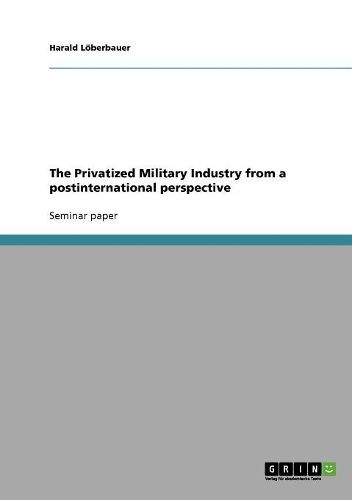Readings Newsletter
Become a Readings Member to make your shopping experience even easier.
Sign in or sign up for free!
You’re not far away from qualifying for FREE standard shipping within Australia
You’ve qualified for FREE standard shipping within Australia
The cart is loading…






Seminar paper from the year 2007 in the subject Politics - International Politics - General and Theories, grade: 1, Diplomatic Academy of Vienna - School of International Studies, course: Postinternational Politics, 72 Literaturquellen, 8 Internetquellen entries in the bibliography, language: English, abstract: The Privatized Military Industry (PMI) definitely is on the rise as P.W. Singer argued in 2004. In international relations scholarship, numerous research is available on this topic since the PMI started its rise during the 1990s. After having identified a rather new phenomenon in world politics, the process of the politicization and analytical analysis follows, drawing a comparison to a policy-analysis approach. Doing research on private actors in world politics, offering services falling within the military domain, from a postinternational perspective is a rather new thing. Most researchers analyze the PMI as such, their institutional design, their organization and classify them according to the services they offer. This research is based on a different approach. It analyzes the implications of the PMI to the Westphalian state and state system by referring to postinternationalism as a worldview. What constitutes the postinternational worldview - and what indicators I will use based on this worldview - is explained in part II dealing with theory. Theory in this paper in principle can be summed up with the phrase that the Westphalian state as such is declining in power and that private actors (in our case private military actors) such as TNCs or NGOs are becoming more important and powerful. Some gain and some lose. From this perspective it is the states that lose and the private actors that gain.
$9.00 standard shipping within Australia
FREE standard shipping within Australia for orders over $100.00
Express & International shipping calculated at checkout
Seminar paper from the year 2007 in the subject Politics - International Politics - General and Theories, grade: 1, Diplomatic Academy of Vienna - School of International Studies, course: Postinternational Politics, 72 Literaturquellen, 8 Internetquellen entries in the bibliography, language: English, abstract: The Privatized Military Industry (PMI) definitely is on the rise as P.W. Singer argued in 2004. In international relations scholarship, numerous research is available on this topic since the PMI started its rise during the 1990s. After having identified a rather new phenomenon in world politics, the process of the politicization and analytical analysis follows, drawing a comparison to a policy-analysis approach. Doing research on private actors in world politics, offering services falling within the military domain, from a postinternational perspective is a rather new thing. Most researchers analyze the PMI as such, their institutional design, their organization and classify them according to the services they offer. This research is based on a different approach. It analyzes the implications of the PMI to the Westphalian state and state system by referring to postinternationalism as a worldview. What constitutes the postinternational worldview - and what indicators I will use based on this worldview - is explained in part II dealing with theory. Theory in this paper in principle can be summed up with the phrase that the Westphalian state as such is declining in power and that private actors (in our case private military actors) such as TNCs or NGOs are becoming more important and powerful. Some gain and some lose. From this perspective it is the states that lose and the private actors that gain.